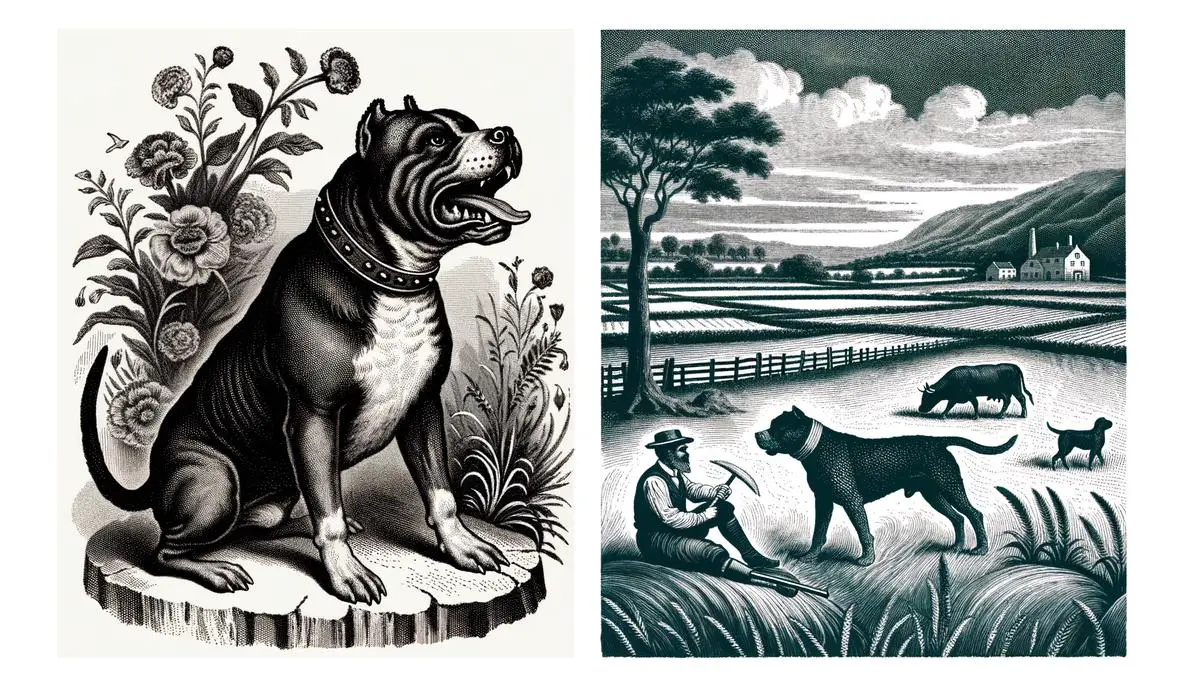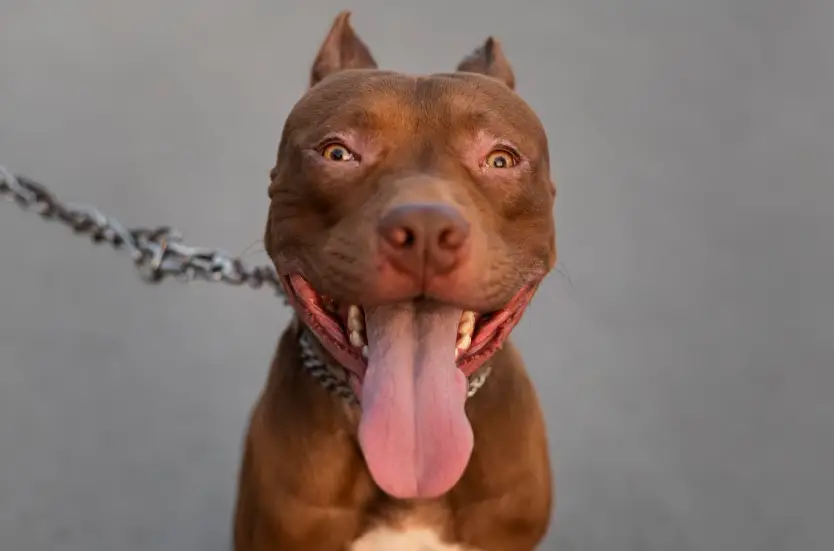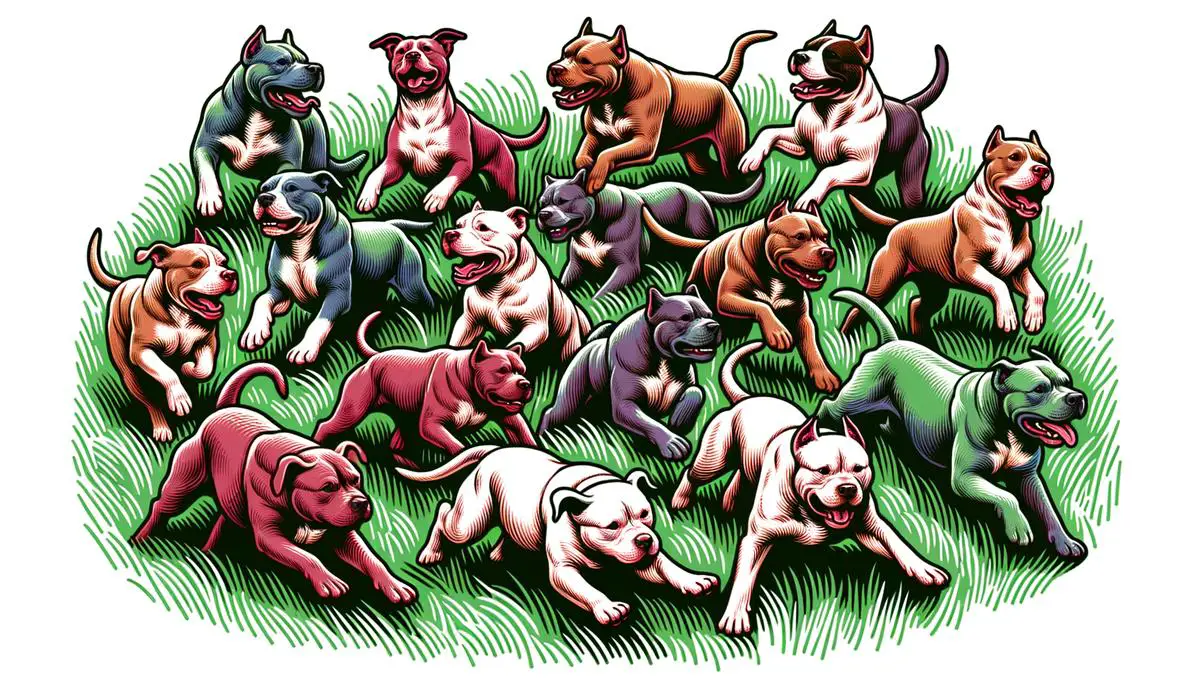Why are pitbull so dangerous? – Understanding the Breed

The history and genetics of pit bulls offer a compelling narrative that sheds light on their current behavior and societal perception. By examining the journey from their origins to their present status, we gain insight into the multifaceted nature of these dogs. This understanding is crucial for addressing the stereotypes and challenges they face today.
The History and Genetics of Pit Bulls
Pit bulls originally hail from England, bred in the 19th century for the blood sport of bull-baiting. Post-baiting era, these dogs were domesticated as farm helpers, showcasing their versatile nature. Moving across the Atlantic, American settlers utilized pit bulls for guarding properties, hunting, and as companion animals. This shift from fierce competitors in the ring to dependable farm dogs and loyal companions is noteworthy. Their history is a key ingredient in the mix that shapes their behavior today.
Selective breeding played a critical role in the evolution of pit bulls. Originally crafted to combine the agility of terriers with the strength of bulldogs, they were designed to be muscular and resilient. Breeders selectively emphasized traits like physical robustness, courage, and an indefatigable spirit. Over time, these characteristics became inherent in the breed, making them both admirable and controversial.
Understanding that pit bulls were bred for various purposes including blood sports is vital. It’s a testament to their tenacity and robustness. However, attributing their behavior solely to this part of their history would be an oversimplification. The genetic pool of pit bulls also incorporates characteristics selected for farm work and companionship which brings out a different side of their personality – loyal, protective, and affectionate towards their family.
This diverse breeding background plays a crucial role in shaping the breed’s behavior. Genetics confers upon pit bulls a certain predisposition, but it’s the environment, training, and socialization that ultimately decide the behavior of the individual dog. For pit bulls, understanding their genetic makeup and history clarifies why they display a wide range of behaviors – from aggressive to incredibly gentle and loving.
When considering a pit bull’s temperament, it’s crucial to look beyond stereotypes and understand the complex interplay of genetics and upbringing. Proper socialization, training, and care can bring out the best in pit bulls, aligning more with their roles as companions than as fighters. This underscores the importance of responsible ownership and debunking myths surrounding the breed.
Genetics imbues pit bulls with certain innate tendencies, but each dog is an individual. Like humans, they are products of both their genetic heritage and their environment. Recognizing this blend of factors is essential in appreciating pit bulls for who they truly are – multifaceted creatures shaped by a rich history.

Behavior and Temperament
Delving further into the behavior and temperament of pit bulls compared to other breeds, it’s essential to examine data on aggression levels. Studies, including those published in the “Journal of Veterinary Behavior,” show that when comparing aggression toward humans, pit bulls are not significantly more aggressive than other breeds. In fact, smaller breeds, such as Dachshunds and Chihuahuas, often exhibit higher levels of aggression toward humans. However, pit bulls may show higher levels of aggression toward other dogs, which echoes the breed’s historical use in dog-fighting rings.
This nuanced view of pit bull behavior emphasizes the need for proper training and socialization. An obedient pit bull that is well-socialized demonstrates that aggression is not a breed-specific trait but a behavior that can be mitigated with the right approaches. Similarly, breeds perceived as friendly, like Golden Retrievers, can exhibit aggressive behavior if improperly socialized or trained, underscoring that environment and upbringing play crucial roles across all breeds.
Canine behavior experts suggest that although genetics offer a foundation, environment, training, and socialization overwhelmingly shape a dog’s behavior. Positive reinforcement, consistency in training, and exposure to various situations can create a responsive and well-adapted pet, irrespective of the breed.
Interestingly, studies on dog aggression highlight a pivotal factor: the behavior of the dog owner. Researchers found correlations between aggressive dogs and owners with harsh training methods or inadequate knowledge of dog behavior. This insight shifts some emphasis from the breed to the owner’s behavior and their approach to training and socialization.
In terms of temperament, pit bulls often exhibit a high level of energy and eagerness to please, traits that, when channeled through correct training methodologies, translate into excellent companionship and work ethic. This contrasts with more independent breeds like cats or cat-like dog breeds such as the Basenji, which might not require as much attention and direct engagement.
Given these considerations, it becomes apparent that pit bulls, like any breed, thrive in environments where they receive appropriate training, love, and socialization. The assertion that they are inherently more aggressive than other dogs doesn’t hold up against the backdrop of behavioral science. Instead, understanding each dog as an individual and providing the care and training best suited to their needs is paramount for fostering a loving and safe relationship between dogs and their owners.

Pit Bulls in Society
Media portrayal of pit bulls often swings towards the dramatic, emphasizing negative incidents that involve them, thereby shaping a public view that leans towards fear and caution. This powerful narrative has contributed significantly to breed-specific legislation (BSL), laws that target specific dog breeds perceived as dangerous, often directly affecting pit bulls. Such laws can include restrictions or outright bans on ownership of these breeds, significantly affecting pit bulls’ legal standing and living situations across various regions.
The fallout from these societal views and legislations is stark in shelters across the country. Pit bulls frequently top the list of breeds found in shelters and, consequently, lead in euthanasia rates. Misconceptions about their temperament deter potential adopters, leaving many pit bulls to live much of their lives in shelters, with a significantly reduced chance of being adopted compared to other breeds.
Owner experiences are also colored by this widespread public perception. Individuals who choose to adopt pit bulls often face hurdles ranging from housing restrictions to increased insurance premiums, not to mention the social stigma that comes from walking a breed that many cross the street to avoid. Such challenges can make the already demanding task of pet ownership even more laborious, creating a cycle that further entrenches the negative stereotype.
Efforts to shift the narrative around pit bulls have been gaining traction, thanks in part to advocates who tirelessly work to showcase the breed’s positive attributes. Social media campaigns, pit bull-friendly events, and stories that highlight pit bulls saving lives or working as therapy dogs contribute to a slowly changing public opinion. Even more so, educational programs that aim to provide the public with facts rather than fear, emphasizing responsible ownership and the importance of judging an individual dog rather than the breed as a whole, are vital.
On a practical level, education plays a crucial role in altering perceptions. Programs intended to inform communities about proper dog training, the significance of spaying and neutering to prevent unwanted litters, and how to safely interact with dogs are essential. These initiatives emphasize that the behavior of a dog is more strongly influenced by owners’ practices and the environments in which they are raised, rather than the breed itself.
Ultimately, shifting the public perception of pit bulls is not just about advocating for one breed but promoting a broader understanding that any dog, regardless of its breed, can be a loving and safe companion with the right care, training, and socialization. As this message continues to spread, the hope is that pit bulls will begin to be seen under a new light – not as inherently dangerous animals, but as the loyal, affectionate pets they can be when raised in a loving home.

Responsible Ownership
Responsible pit bull ownership necessitates a focused attention on regular exercise and energy management. Pit bulls are bursting with vitality which needs to be positively channeled through activities such as walking, running, or playing fetch. A physically stimulated pit bull is less likely to exhibit undesirable behaviors borne out of boredom or excessive energy.
Creating a secure and supportive environment is also crucial. Due to their strength and determination, pit bulls should have a physically secure space. This includes a fenced yard where they can roam freely and safely. Look into the height and resilience of fencing; pit bulls can surprise you with their agility.
Engage in continuous education and advocacy for the breed. Owners should arm themselves with knowledge about pit bull health issues, such as susceptibility to certain hereditary conditions like hip dysplasia or allergies. Sharing this knowledge with others can dispel myths and educate the wider community about the breed’s needs and temperament.
Discipline is essential, but it’s vital to employ positive reinforcement techniques. Pit bulls, known for their eagerness to please, respond well to rewards-based training over punitive measures. This method solidifies trust between the dog and owner while ensuring lessons are learned in a loving framework.
Emphasizing leash training cannot be understated because it sets the foundation for managing your pit bull in public spaces. Mastery over commands like ‘sit’, ‘stay’, and ‘come’ can mitigate confrontations with other animals or people, showcasing responsible pet ownership.
Veterinary care is non-negotiable. Regular check-ups can catch potential health issues early. Furthermore, discussing your pit bull’s diet with a veterinarian ensures they receive the essential nutrients for a healthy life, considering their active nature.
Prospective owners should consider pet insurance to manage unforeseen health issues financially. Given their high energy levels and physique, pits may be prone to accidents or injuries, so it’s practical to be prepared for any vet bills that might arise.
Acknowledge the profound bond between pit bulls and their families. These dogs are known for their loyalty and affection, craving close contact and involvement in family activities. Inclusion reinforces their significance in the household and diminishes separation anxiety or destructive tendencies when left alone.
Implementing a consistent routine facilitates a stable environment for pit bulls, from feeding times to exercise schedules. Consistency helps curb anxiety-driven behavior by setting clear expectations of daily life’s structure.
Integrate societal role strategies like therapy dog training programs if your pit bull shows an aptitude for loving interaction. Pit bulls can excel in roles that offer emotional support or companionship to those in hospitals, schools, or nursing homes, showcasing their gentle nature and debunking negative stereotypes.
Ultimately, responsible pit bull ownership is a pledge to understand, respect, and cater to the needs of this misunderstood breed fully. It’s about championing their cause, celebrating their affectionate nature, and integrating them as valued family members while acknowledging and responsibly managing their physical strength and tenacity. By doing so, owners ensure not just the wellbeing of their pit bulls but also contribute positively to changing societal perceptions, paving the way for a future where these dogs are judged by their character rather than their breed.

In conclusion, the essence of responsible pit bull ownership lies in recognizing and nurturing the breed’s inherent qualities through proper care, training, and socialization. By doing so, we not only ensure the well-being of these loyal and affectionate dogs but also play a pivotal role in transforming societal perceptions, fostering a future where pit bulls are appreciated for their true character.
